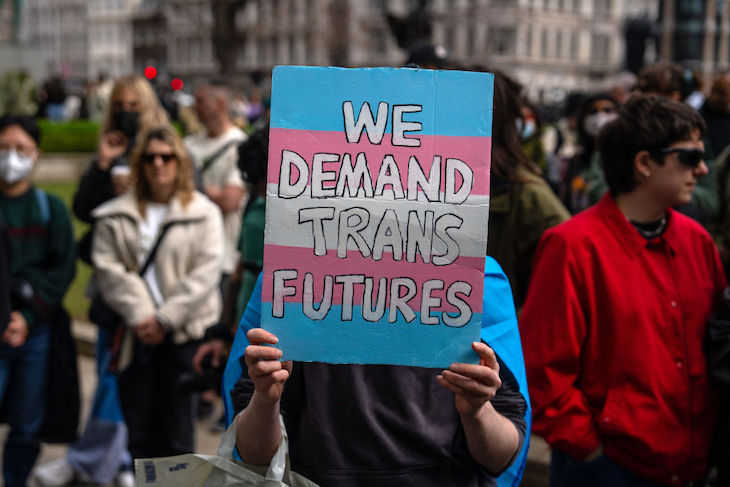The number of people applying for a Gender Recognition Certificate (GRC) has reached a new record. Government figures revealed that there were 1,397 applications in 2023-24 and, of those, 1,088 were granted. Labour has vowed to simplify the process of changing gender, meaning that the numbers could rise further.
Almost 200 applicants for a Gender Recognition Certificate were under 25
Is this something to celebrate? Or should we be worried? These are already big numbers for a life-changing process that was originally envisaged to serve a vanishingly small group of people. The stats from 2023-24 aren’t a one-off: since the pandemic, the numbers have been growing year-on-year. To put it in context, only 3,925 applications were made in the 12 years between 2007/8 and 2018/19 – an average of 327 per year. This indicates a jump of over 400 per cent from that baseline.
This matters. A GRC changes an individual’s gender ‘for all purposes’, according to the 2004 Gender Recognition Act. Section 22 of the Act then shrouds that change in secrecy, ‘It is an offence for a person who has acquired protected information in an official capacity to disclose the information to any other person.’
In practical terms, someone with a GRC can assert that they are the sex they claim to be, and nobody can prove otherwise – at least from official documentation. Birth certificates changed with a GRC look just the same as any other birth certificate. If a man who acquired a GRC for nefarious purposes demanded access to women’s single-sex services, the provider would struggle to prove he was indeed a man.
Two years ago, after ForWomenScotland challenged this absurdity in court, Judge Lady Haldane ruled that, ‘the meaning of sex for the purposes of the 2010 [Equality] Act, ‘sex’ is not limited to biological or birth sex, but includes those in possession of a GRC obtained in accordance with the 2004 Act stating their acquired gender, and thus their sex.’ [my emphasis]
Under British law then, not only can a woman have a penis, but someone of the female sex can have a penis – because there is no need for someone to change their body to acquire a GRC. It’s total madness, and it is a major safeguarding vulnerability that leaves women unable to defend their boundaries.
Then-prime minister Theresa May pledged in 2017 to let people change their gender without any medical checks. Thankfully her successors have seen the risks of such folly, but the gatekeeping is hardly rigorous. Two medical reports and a diagnosis of gender dysphoria and Bob’s your aunt. While the queue for NHS gender services snakes into the distance, several private providers offer consultations at a price. But when the diagnostic criteria for gender dysphoria are based on the testimony of a patient who is effectively a customer, how do we know that clinicians won’t simply agree with whatever the patient tells them?
Two decades ago, most applicants were older, and male. These days there are increasing numbers of young people in the mix – in the latest figures, almost 200 applicants were under 25 years of age. Are these young people fully aware of how their lives will change as a result?
While so many people seem to want a GRC, it’s not clear to me what good it will do them in the long run. It’s certainly not a necessity for transsexuals. I transitioned – socially, medically and surgically – some years ago but I never bothered to apply for a GRC. My birth certificate might still announce my sex (correctly) as male, but rarely does that document leave my filing cabinet. Much more important is how other people perceive me. Indeed, if a transition is not good enough without a GRC then it will not be good enough with one. Unless, that is, the holder wants to ignore the perceptions of others and force their way into places that they might not be wanted. Then it becomes the ace of trumps.
Labour’s manifesto promise to ‘modernise, simplify, and reform the intrusive and outdated gender recognition law’ has not yet featured in its legislative programme, but it has not been retracted. So while Keir Stamer might finally have twigged that a woman has a vagina and a man has a penis, his party could risk making it simpler for applicants to the use the law to state otherwise. That is the wrong direction of travel.
If the Gender Recognition Act is here to stay, it needs to be toughened up. When the most basic of boundaries – the legal distinction between male and female – is at stake this matters not just to the increasing number of people with a GRC, but to everyone.








Comments